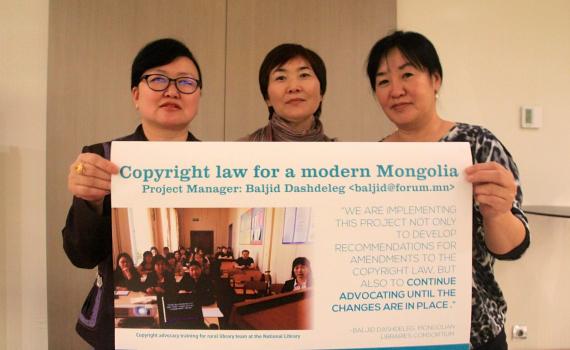
BACKGROUND
Since the democratic revolution in 1990, Mongolia’s political, social and economic life has undergone radical change. The legal environment has been re-created with new legislation adapted for the market economy, and the IP system has been entirely reformed.
Mongolia’s development priorities are set out in key policy documents such as UNDP’s Millennium Development Goals in Mongolia and a Comprehensive National Development Strategy of Mongolia (nds_approved_eng.pdf) that envision the development of a knowledge-based society to provide economic growth and to meet the intellectual needs of its citizens. As a sign of the government’s commitment to the provision of public ICT access, 70% of public libraries in Mongolia now have Internet access, and Mongolia’s first library law was adopted in 2013.
OVERVIEW
When librarians learnt that the copyright law was being revised, they wanted to become active in the review process to ensure that the new law meets the needs of libraries and their users in Mongolia today.
In 2013, EIFL provided a grant to the Mongolian Libraries Consortium (MLC) to gather evidence, evaluate the copyright law and develop recommendations in partnership with the Ministry of Culture, Sport and Tourism in Mongolia.
We continue to support the work as the copyright law review process continues.
MAIN ACTIVITIES
- Gathering evidence: a representative sample of education and public libraries in rural and urban areas were surveyed to identify commonly provided library services that involve copyright. The results confirmed activities common to libraries everywhere e.g. lending books, photocopying print materials and digitization.
- Evaluating the copyright law and developing recommendations: international and local copyright experts undertook a comparative analysis of library activities and the law on copyright (2006). Their joint conclusion was that the law does not meet the needs of Mongolia’s libraries today. In many cases, the provisions are limited even for socially important activities such as programmes to digitize and preserve collections, and to make them available for education and scholarship. Recommendations for improvements include allowing preservation of an entire work (instead of only parts of a work), enabling the harvesting of websites so that culturally valuable materials that appear only online are not lost to posterity, and protecting copyright exceptions from terms in licences for e-resources.
- Presenting recommendations to the Intellectual Property Office (IPO): engaging for the first time with the Intellectual Property Office (IPO), MLC presented their recommendations so that the IPO has developed a good understanding of modern library practices and what libraries are requesting.
TIMELINE
2013 - 2015.
PROGRESS
- Good working relations with IPO have been developed. As a result, for example, the Mongolian Libraries Consortium (MLC) was invited to present the library perspective at an international copyright conference in Ulaanbaater in May 2013, the first time the library community was involved in a high level copyright event.
- As a new copyright law has not yet been adopted in Mongolia, the library community continues its engagement with policy-makers to advocate for libraries and their users, in particular to press for the MLC proposals.
- MLC librarians are using their new knowledge and skills to support advocacy for implementation of the Marrakesh Treaty for persons with print disabilities into national copyright law, and remain determined to follow the process through in order to get the best results for libraries and their users in Mongolia.
ADDITIONAL RESOURCES
Read the project case study and poster outlining key achievements, tactics and tools, success stories and lessons learnt from the project.
Link: EIFL in Mongolia.





